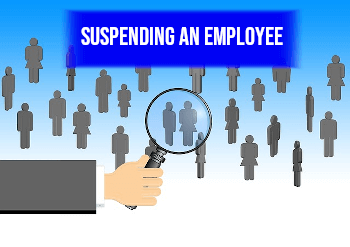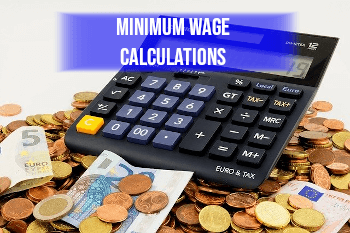The Employment Rights Advice Blog
 Articles, news and updates on employment law in Ireland
Articles, news and updates on employment law in Ireland
for employees and employers
____________________________________________________________________________________________________________________________________________________________________________________________________________________________________________________________________________________________________________________________________________________________________________________________________________________________________________________________
 Suspending an employee
Suspending an employee
You need a very good reason
Because of the impact it can have on an employee, as an employer you must have a very good reason to suspend them. When can I suspend an employee? How should I suspend an employee? These are just some of the questions we examine in this article about suspending an employee in Ireland.
Suspension of an employee usually arises when an allegation of misconduct arises in connection with them. A decision has to be made early on regarding their suspension. Ask the question, can I carry out the investigation in a fair manner without suspending the employee? If the answer is yes, then you should not suspend them. If there is a risk that they will interfere with witnesses, tamper with evidence or cause damage to the property or reputation of the business, then you should strongly consider suspension of the employee. Suspension should never be about punishment.
It might seem like a good idea at the time. Suspend the employee and carry out an investigation into a disciplinary matter. It is easier to talk to other employees when the subject of the complaint is not around. What loss can they suffer if they are on full pay? It will be like a paid holiday. If you continue in that train of thought it will be more like a major claim in the Workplace Relations Commission and many hours and days spent preparing for and fighting the claim, probably without success.
What should I consider before suspending an employee?
The first thing you should do is find out the full extent of the allegations against the employee. Get the person making the complaint to outline it in full detail. Then when you are clear about what is being alleged, talk to the accused employee and listen to their side. The verb listen is the most important word in that previous sentence. Having listened to both sides, you can then consider whether or not it is appropriate to suspend the employee while you carry out an investigation into the allegation.
In The Governor and Company of the Bank of Ireland and James Reilly the Court pointed out the serious nature of suspending an employee. In particular it stated that the reputational damage may never be overcome, even where the accused is cleared of the initial allegations. The case is regarded as the leading guidance for suspending an employee. It was stated that suspension would be justified in the following circumstances:
-
To prevent repetition of the conduct complained of;
-
To prevent interference with evidence;
-
To protect individuals at risk from such conduct; or
-
To protect the employer’s business and reputation.
In the light of this and other cases you should consider the following points before suspending an employee prior to investigating a disciplinary matter:
-
What alternatives are there? Having identified the risks, is there another way to protect the evidence/eliminate the risk? For example, limiting access to certain parts of the business.
-
Is suspension covered in the contract of employment or any related staff documents.
-
This is usually covered in the disciplinary policy document. If you do not have one, you should get one.
-
Are you authorised by your company to suspend another employee? In other words, is it above your pay grade?
-
How does the suspension affect the employee? Will it damage the trust and confidence between the employer and the employee?
-
Is the alleged offence sufficiently serious to merit a suspension?
How do I suspend an employee?
If, having carefully considered the above matters, you believe that the decision to suspend an employee on full pay, while you investigate a disciplinary matter can be justified then you should take these additional steps:
-
Notify the accused employee, in writing, of the reason for their suspension and the fact that it is temporary. This must be clearly stated, so that the accused can fully understand the extent of the allegations.
-
Emphasise the confidential nature of the matter
-
Outline some do’s and don’ts for them. For example, do be available to assist the investigation and don’t carry out work for themselves or anyone else during working hours
-
Remain available for work
-
Do not attend the office or contact fellow workers or business contacts.
-
Appoint an independent person to carry out the investigation, efficiently and without delay.
-
Follow your company disciplinary procedures.
-
Let the accused know that they will have an opportunity to state their case in detail
-
Decide on what to say to other employees. Keep the matter confidential, but give neutral explanations. e.g. absent on personal grounds.
-
Nominate someone to handle enquiries on behalf of the suspended employee, if necessary.
-
Only suspend for the shortest possible time. Indefinite suspension will be seen as a punishment and a breach of contract.
-
Put it in writing. This covers all communication with employees, as well as decisions you make, and how you made them.
Where can I get a useful precedent of an employee suspension letter?
In our DIY documents section we offer a great selection of useful precedents for employer and employee. Have a look at our employee suspension letter. It is designed to help employers who need to send a suspension letter to an employee pending an investigation into a disciplinary matter.
When can a suspended employee return to work ?
If the investigation has been completed and the assessed risks on longer pose a threat, then the employee should be free to resume work duties. You should meet with the employee to help them return to work. Encourage them to share their views on returning to work. Agree on what to tell other employees in explanation of their absence.
Where can I get help and assistance in relation to suspending an employee prior to carrying out an investigation?
It can be helpful to get another opinion on what you should do, when considering the suspension of an employee pending an investigation of a disciplinary matter. Contact us using the orange Tell Me More button below and we will be in touch at a time that suits.
Spread the knowledge. If you found this article useful, please like and share using any of the social buttons below
Writing a social media policy
Why you need to start
![]() Why do I need a social media policy? I need some tips on how to create a social media policy for work. I want to engage more with my customers on social media, what are the pitfalls to avoid? These are just some of the questions we answer in this article.
Why do I need a social media policy? I need some tips on how to create a social media policy for work. I want to engage more with my customers on social media, what are the pitfalls to avoid? These are just some of the questions we answer in this article.
Social media has a huge impact on the average consumer/customer/client. It can be used to generate leads, improve brand identity and interact with customers.
Whether you use social media to promote your business or not, you still need a social media policy, because your employees and your customers use social media in their daily lives.
Social media can have a positive or a negative impact on your brand. A social media policy can help steer the impact towards the positive end.
What is a social media policy?
The term social media incorporates the social channels like, FaceBook, Twitter, Instagram, LinkedIn,YouTube, and many more. Because news can travel so quickly through the social media channels, you need to be prepared. If you think that a social media policy is a waste of time, then you are missing out on a tremendous opportunity to engage with customers, existing and potential. You need to be prepared for negative publicity. The best preparation is to aim to avoid it, but be ready when it happens. That in a way is what a social media policy is about. It is a guide to help your employees present a positive image of your business. It can also be a disaster recovery plan, for when social media turns negative.
A good social media policy can achieve the following:
-
Keep your brand in front of your customers in a consistent manner
-
Prevent disclosure of sensitive information
-
Avoid regulatory or legal breaches. e.g. Copyright,
-
Avoid a PR disaster
-
Provide an advance plan of action to help stop a PR blip from becoming a disaster
-
Create an awareness among your employees of the power and responsibility that comes with social media
-
Keep everyone promoting your brand’s image
What should I put into a social media policy?
Be clear about everyone’s roles
Depending on the size of your business, you may have a number of employees engaging in social media on behalf of your company or all may fall to one person. All employees must buy into the social media policy, whether they are actively posting on behalf of the company or not. Because of the confined social networks we live in , it is a reality that social media has the power to influence, in a positive or negative way, our brand success. It is important therefore that everyone is on board.
The following roles and responsibilities need to be addressed:
-
Who posts what and how often
-
Customer service review to respond to increased demand as a result of good social media response.
-
Overall planning of social media and how it promotes the brand
-
Passwords, access and security in generally
-
Monitoring social media
-
Staff training and awareness
-
Who signs off on legal, financial, content matters?
-
Who oversees and coordinates a crisis response?
Take security measures
Who controls the passwords to your social media accounts? Limit the number of people who can change them. The fewer the better. One is best. Keep your software and hardware protected and up to date. You do not want to be hacked. Who is the go to person if an employee believes that there might be a problem? Have a plan in advance of a security breach or a PR disaster. It may never happen, but if you do not have a plan for what action to take, then the crises will take on a life of its own and cause damage to your brand. It is always better to be organised and get on top of the crisis as soon as possible.
Keeping it legal
A good social media policy should include a section explaining how to stay compliant with current legislation.
Avoid breaches of copyright, offensive images and comments, discrimination. defamation, company code of ethics
Privacy is vital. The social media policy should outline in detail the importance of protecting customer and employee privacy. It should outline the procedure to be followed in order to maintain privacy. Within the area of privacy is confidentiality. You should protect the confidential information of your business.
Guidance for employees
It is important that employees are made aware of the strengths and weaknesses of posting on social media and its effect on the business. This should cover how employees use their personal social media accounts, when it impacts their employer. If they breach the code of ethics of your business, by using hate speech etc, then they should be made aware of the consequences. In a more subtle way, what they post can also affect their relationships with their work colleagues and customers.
Tips on implementing a social media policy
Having read this far, you now have a good idea of what a social media policy should contain. It is always a good idea to seek input from key staff members. These may include your HR person, office manager, any person on whom you will rely for the implementation of the policy. This gives them an opportunity to contribute at an early stage and they may mention something which you have overlooked.
If you have an employee handbook, you should add the social media policy to it. Introduce it to all of your employees and encourage feedback and questions. If you haven’t an employee handbook, you should get one.
For more on employee handbook see
Review it regularly, because social media is changing constantly.
Download our social media policy template and adjust it to suit your needs.
Spread the knowledge. If you found this article useful, please like and share using any of the social buttons below.
Out of date contracts, policies and procedures could cost you more than money
IS YOUR HR KEEPING UP WITH ALL OF THE CHANGES ?
 The HR Health Checkup service is a free, confidential, audit of your current Human Resources policies and procedures. As part of the audit we will look at any employment contracts you are using, any written policies you may have, as well as learning about the way you work.
The HR Health Checkup service is a free, confidential, audit of your current Human Resources policies and procedures. As part of the audit we will look at any employment contracts you are using, any written policies you may have, as well as learning about the way you work.
We’ll discuss with you any areas of concern, for example, where you may not be meeting employment law or other legal requirements. We’ll also help you to protect against future compensation claims and set up a positive HR environment which promotes the success of your business.
Oue Free HR Health Checkup is geared for small and medium-sized companies. It is free of charge to those without in-house HR support.
Having out of date procedures, contracts, documents can leave you open to large compensation claims and damage to your reputation.
Please complete the below form and we will send you the Free Questionnaire for completion. Items marked with an * are required.How to calculate the minimum wage
What is reckonable and what is non-reckonable?

This article is designed to help employers in Ireland comply with and calculate the national minimum wage applicable to their individual employees. We often get asked question such as, How do I calculate the rate per hour? What can I include as pay? What is the pay reference period? We will answer these questions and more.
The National Minimum Wage Act 2000 introduced the minimum wage to the employers and employees of Ireland. The legislation sets the minimum wage to which most workers in Ireland are entitled. The act lists categories of workers to whom a lower rate applies because of their circumstances e.g. a young person under 18. Employment Regulation Orders also set the wage rates for persons working in certain sectors.
UPDATE 2020
The national minimum wage will increase to €10.10.
Of course nothing in the National Minimum Wage Act prevents an employer from paying above the rate
How do I calculate the rate per hour?
The easy answer is to divide the gross pay by the total number of hours worked. Care must be taken however, when deciding on what what is to be included, and what must be left out.
What can I include as pay?
The act, in its schedule,refers to this as reckonable pay components and lists them as the following:
|
PART 1 — RECKONABLE COMPONENTS |
||
|
1. Basic salary. |
||
|
2. Shift premium. |
||
|
3. Piece and incentive rates, commission and bonuses, which are productivity related. |
||
|
4. The monetary value of board with lodgings or board only or lodgings only, not exceeding the amount, if any, prescribed for the purposes of this item. |
||
|
5. The amount of any service charge distributed to the employee through the payroll. |
||
|
6. Any payments under section 18 of the Organisation of Working Time Act, 1997 (zero hour protection). |
||
|
7. Any amount in respect of any of the above items advanced in a previous pay reference period that relates to the specific pay reference period. |
||
|
8. Any amount in respect of any of the above items earned in the specific pay reference period and paid in the next pay reference period or, where section 9 (1)(b) applies, paid in the pay reference period in which the record of working hours is received or due to be received by the employer or the pay reference period immediately after that. |
What must I not include?
The act refers to these as non-reckonable pay components and lists them as follows:
|
PART 2 — NON-RECKONABLE COMPONENTS |
||
|
1. Overtime premium. |
||
|
2. Call-out premium. |
||
|
3. Service pay. |
||
|
4. Unsocial hours premium. |
||
|
5. Any amount distributed to the employee of tips or gratuities paid into a central fund managed by the employer and paid through the payroll. |
||
|
6. Public holiday premium, Saturday premium and Sunday premium, where any such holidays or days are worked. |
||
|
7. Allowances for special or additional duties including those of a post of responsibility. |
||
|
8. Any payment of expenses incurred by the employee in carrying out his or her employment, including travel allowance, subsistence allowance, tool allowance and clothing allowance. |
||
|
9. On-call or standby allowance. |
||
|
10. Any payments for or in relation to a period of absence of the employee from the workplace, such as sick pay, holiday pay, payment for health and safety leave under the Maternity Protection Act, 1994 , or pay in lieu of notice, but not including a payment under section 18 of the Organisation of Working Time Act, 1997 (zero hour protection). |
||
|
11. Any payment by way of an allowance or gratuity in connection with the retirement or resignation of the employee or as compensation for loss of office. |
||
|
12. Pension contributions paid by the employer on behalf of the employee. |
||
|
13. Any payment referable to the employee's redundancy. |
||
|
14. Any advance of a payment referred to in Part 1 of this Schedule in the specific pay reference period relating to a subsequent pay reference period. |
||
|
15. Any payment-in-kind or benefit-in-kind, except board with lodgings, lodgings only or board only. |
||
|
16. Any payment to the employee otherwise than in his or her capacity as an employee. |
||
|
17. Any payment representing compensation for the employee, such as for injury or loss of tools and equipment. |
||
|
18. An amount of any award under a staff suggestion scheme. |
||
|
19. Any loan by the employer to the employee, other than an advance payment referred to in paragraph 7 in Part 1 of this Schedule. |
What is the pay reference period?
As the employer you can set the pay reference period. The pay reference period, is the period from which the average hourly pay will be calculated. You can choose a week, a fortnight or a month. You cannot exceed a month.
As an employer you must outline the selected pay reference period in the statement of employment conditions which you are obliged to give to your employee within 4 weeks of their starting employment with you. This is laid out in the Terms of Employment (Information) Act 1994. For more see
What working hours apply?
The applicable working hours are the greater of:
-
The hours laid out in the contract of employment, collective agreement or similar documentation
or
-
The actual hours which the employee worked or was available for work and for which they were paid.
Included in the definition of working hours are overtime, travel time as part of the job and training time during normal working hours when authorised by the employer.
Excluded from the definition are, time spent on standby, when not at the workplace, leave, strike,lay off, or in the case of payment in lieu of notice. Time spent travelling to and from work is also excluded.
Who is excluded from the right to receive the national minimum wage?
The following employees are excluded from receiving the national minimum wage:
-
A person employed by a close relative. This can include, a spouse, civil partner or parent.
-
A person in a statutory apprenticeship
-
A person who is under 18. The rate applicable to a qualifying person under 18 is a reduced amount of the national minimum wage.
What if I cannot afford to pay the national minimum wage?
If you cannot afford to pay the national minimum wage as a result of financial difficulty, you can apply to the Labour Court for an exemption. If granted this exemption can last for between three months and one year. You can only apply for one such exemption. The exemption only applies to the national minimum wage. It does not apply to any reduced rate.
You will need to obtain the agreement of a majority of your employees to make the application to the Labour Court. Both you and the employees must agree to be bound by the ruling of the Labour Court.
You must be able to show that you will have to lay off or dismiss employees if the minimum wage had to be paid.
Protection against victimisation
The National Minimum Wage Act protects any worker against being victimised for requesting the national minimum wage. The employee is also protected against being dismissed for seeking their rights under the Act. They may bring a claim for unfair dismissal without the normal restrictions relating to length of service or number of hours worked per week.
Be careful if you are cutting the hours of a worker, following an increase under the National Minimum Wage Act, in an attempt to keep wages in line with previous periods. Any reduction in time must have a comparable reduction in duties or work.
What rates are applicable?
Under the Employment Miscellaneous Provisions Act 2018, rates for employees under 18 and those over 18 have been simplified and will be solely based on age.
Trainee rates of pay have been abolished
From 4 March 2019, the following rates have applied:
|
Age |
Amount |
% of NMW |
|
Under 18 |
€6.86 |
70% |
|
18 years old |
€7.84 |
80% |
|
19 years old |
€8.82 |
90% |
|
National Minimum Wage (20+) |
€9.80 |
100% |
From 1 February 2020, the national minimum wage will increase to €10.10.
What happens if I get it wrong?
If you make a mistake and pay less than the minimum wage to a qualified employee then y9u should correct the mistake immediately. If you fail to do so the employee may refer the matter to the Workplace Relations Commission (WRC). The can ask for the case to be dealt with by an inspector or an adjudicator, but not both. Before referring it to the WRC the employee must request you to correct the mistake and restore them to the correct position under the National Minimum Wage Act. You then have two weeks to resolve the matter.
Where can I get help?
If you have more questions to ask, or would like someone to check that you are compliant, please contact us using the orange Tell Me More button below. We will contact you at a time that suits.
Spread the knowledge. If you found this article useful, please like and share using any of the social buttons below.
Latest Employee Blogs
- Performance Improvement Plan or Exit Strategy?
- Whistleblower awarded five years salary by Workplace Relations Commission
- Unlawful COVID-19 pay cut
- Unfair Redundancy Case
- How to raise a problem at work
- Trade Secrets and Whistleblowing
- Is your fixed term contract valid?
- What is it like to bring an unfair dismissal claim?
- Employer relocation
- End of P45
Latest Employer Blogs
- Changes to probationary period
- Redundancy Update
- COVID-19 Vaccination Data in the workplace
- Statutory Sick Pay Scheme
- The Right to Disconnect
- Covid-19 Can I use lay off and short time to cope with Covid-19 ?
- Covid-19 (The Coronavirus) Tips for employers
- Social Media Monitoring in the Workplace
- Using 3rd party CCTV footage
- Do I need a Data Protection Officer ?









